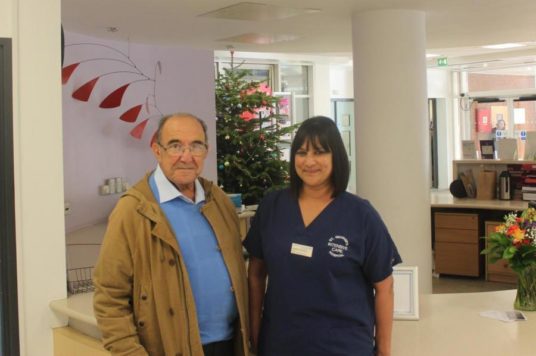Off duty nurse saves man’s life during supermarket shop
A nurse from St George’s Hospital has been reunited with the man whose life she helped save during a trip to the supermarket.
Marietta Armoogum, Sister on the Neuro Intensive Care Unit at St George’s, was shopping whilst off duty in Worcester Park Waitrose in September when she rushed to the aid of Yagoub Khoi-Abbasi, 84, who had collapsed outside the entrance of the supermarket.
After 19 minutes of CPR, by Waitrose staff, Marietta and the ambulance crew that arrived shortly after, Marietta helped to bring him back to life using a defibrillator.
Marietta, who underwent Immediate Life Support training at St George’s earlier in the year, managed to grab the man’s name just as he was leaving. She then carried on with her shopping before being presented with flowers from the staff in Waitrose.
Mr Khoi-Abbasi spent eight days in St George’s Coronary Care Unit but made a full recovery. Marietta checked in on his recovery and was recently reunited with him and members of his family at St George’s.
Joseph Khoi-Abbassi, his son, said: “On 1 September this year, my father was blessed to be given a new lease of life after an angel, Marietta Armoogum, who works at St George’s, saved his life.
“Nothing in this world can compare to the gift of life that this amazing lady bestowed on our family. For us, this is pure and simple a miracle. No amount of recognition or appreciation can convey the true depth of our feelings towards Marietta, every day we thank her from the bottom of our hearts.”
Marietta said: “I’d had Immediate Life Support training at St George’s a few months prior, so when I saw someone had collapsed outside the shop, the training kicked in, along with an added adrenaline boost.
“I’m so pleased that Yagoub has made a full recovery and is now back home with his family.”
As St George’s specialises in the treatment of cardiac patients, being the regional heart attack and cardiac arrest centre, Mr Khoi-Abbassi was taken to St George’s catheter lab for an emergency coronary angiogram.
Dr Sam Firoozi, Consultant Interventional Cardiologist at St George’s, performed the procedure.
Dr Firoozi explained that the single most important factor influencing survival among cardiac arrest sufferers is immediate or early effective cardiopulmonary resuscitation (CPR).
He said: “Without excellent CPR, patients will either not make it to hospital or will not be in a fit enough state to benefit from the interventions which we provide in the cardiac catheter lab.”
“The emergency lifesaving CPR delivered to Mr Khoi-Abbasi by Marietta meant that he arrived at our catheter lab alive and stable enough to enable us to perform emergency angiography, subsequent intensive care support and treatment and eventually be fitted with an implantable pacemaker-defibrillator.”


